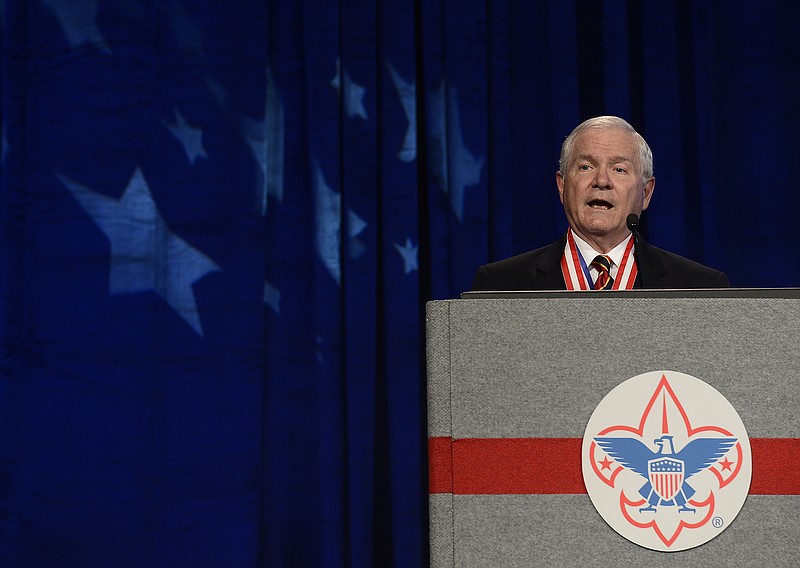Boy Scouts of America President Robert Gates warned Thursday that not allowing openly gay adults in Scout leadership roles "will be the end of us as a national movement."
From a litigious standpoint, he could be right. The organization, which as recently as two years ago declared it could not have gay adults as leaders, doubtless would be forced to defend expensive lawsuits by leaders who are gay but closeted because of the BSA's mandate.
But if the threat of lawsuits as well as hints of the threat of a drop in corporate money are reasons to change century-old standards, that doesn't say much for the leadership of the organization. That's the same as a Christian religious denomination saying, despite what we have believed for millennia and what we believe today, we will sanction same-sex marriages and allow our ministers to be gay because otherwise we are afraid the government will take away our tax-exempt status.
Gates didn't say much more about the subject at this week's national meeting but did indicate the possibility that local Scout organizations soon might be able to decide on their own whether to allow gay leaders.
In 2013, after bitter debate, BSA decided to allow openly gay boys as Scouts but decided against gay adults as leaders. If the organization was uncomfortable with gay adults as leaders then, what changed? Only the threat of lawsuits? Or the withdrawal of corporate financial support?
Research on whether homosexuals are more likely to molest children than heterosexuals can be found on both sides of the debate.
On one hand, while homosexuals comprise perhaps 2 percent of the population, the Journal of Sex Research reported that homosexual pedophiles are responsible for 33 percent of all child sex offenses. On the other hand, the Child Molestation & Prevention Institute noted that 90 percent of child molesters target children in their network of family and friends, with the majority being men married to women.
If pollsters were to ask, many people today would say they don't believe homosexuals molest children in percentages greater than heterosexuals. And, if the BSA should ultimately decide to allow homosexual adults as leaders, don't expect a rash of molestation charges by individual Scouts against their leaders.
But Gates, who as U.S. defense secretary under President Barack Obama ended the military's nearly 20-year-old "don't ask, don't tell" policy about gay service personnel, still may see his words of "the end of us as a national movement" fulfilled for other reasons.
Churches, long proponents of Scouts because of Scouting's original tenets that spirituality and a belief in a higher power were key to the development of young people, may decide against sponsoring Scout troops if the church's denominational ties have a traditional view that the practice of homosexuality is incompatible with Christian teaching.
Parents, if they agree with their church's teaching on homosexuality, may not want their boys involved with an organization in which fellow Scouts and leaders are openly gay.
Leaders, parents and even Scouts who consider homosexuality a sin and a violation of Scouting values may no longer want to be involved. So many things compete with Scouting for boys' time today, and a definitive decision on leaders could be a tipping point for many people.
Last year, an Associated Press report noted that Boy Scouts of America had gradually declined in membership over the previous decade and had fallen 6 percent in the year in which it announced it would allow openly gay boys.
The organization's membership peaked in the 1960s with many baby boomer Scouts and in 2014 was at nearly 2.5 million, with some 1 million leaders.
Scouting did and does offer so many wonderful experiences for boys, from what may be an actual introduction to the outdoors to leadership opportunities, and is likely to continue to do so for many years. But cultural forces and a bow to the corporate dollar may be in the process of winning out over traditional values in preventing the Boys Scouts for much longer from being what Gates called "a national movement."
